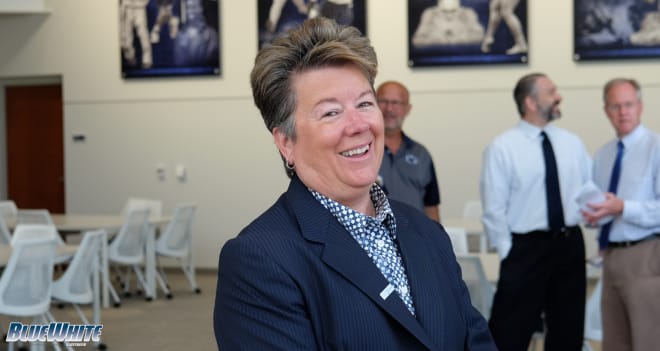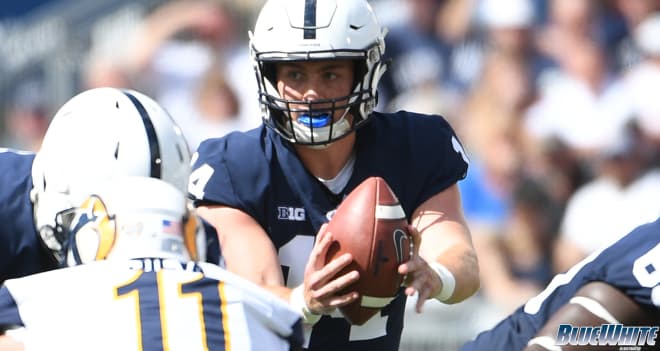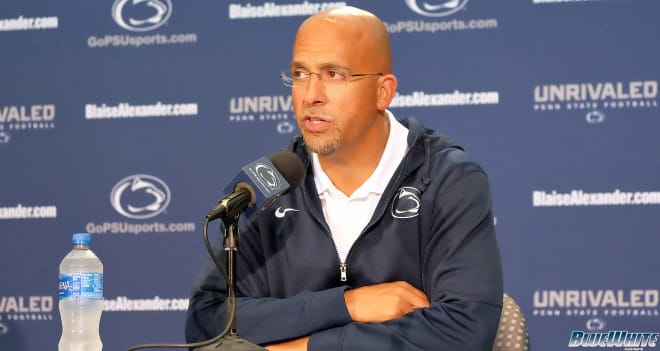Penn State AD Sandy Barbour Updates Athletics' Status, Says Changes Coming
Three months had passed since Sandy Barbour last spoke to the media, April 2, until her press conference via Zoom Wednesday afternoon.
Many things have changed, while other uncertainties very much remain, all of which Barbour acknowledged in her nearly hour-long call.
Let’s take a look at some of the pertinent points to emerge from the session, here:
1) Penn State hasn’t had any positive COVID-19 tests yet among its student-athletes who are back on campus.
At present, that’s 102 negative tests, as each returning member of the football, and men’s and women’s basketball teams, have been tested for a baseline.
Another 60-70 men’s and women’s soccer, and women’s volleyball participants, were tested on Monday and Tuesday this week and their results are still pending.
“We have been testing our student-athletes and staff upon their return. We have as a university, and as an athletic department made a decision that we will report those results every two weeks. We'll do it on Wednesday. I don't know that I will always be the bearer of the testing results, but we will make those public every two weeks up until such time as the university returns all of our students, and then we'll make a decision at that time, how those results might be folded in there,” Barbour said. “So today, I can tell you that we've had 102 student-athlete tests. As of June 30, and we have had zero positives in those 102 tests.”
Barbour acknowledged that test results will not be disclosed publicly for individual coaches and support staff members that are also collected upon their returns, but rather that those would be included in local and state reporting.
2) Barbour went to great lengths to praise the preparations put in place by sports medicine and Penn State Health, and the vigilance of Penn State’s student-athletes, for the negative test results.
“I think it's a great credit to our team, meaning our staff and our performance team, our sports medicine team, Penn State Health who are our sports medicine partners in this. Incredible work is done to prepare for the time... where our first team, which was football, did return; the preparation, the detail in the protocols, the interaction with our experts amongst our faculty, our experts at Penn State Health, our experts within the state,” Barbour said. “From a sports standpoint, we have looked at the NCAA, in the sport of football looked to the American Football Coaches Association, and so there has been a tremendous amount of collaboration here. But our performance team, in conjunction with Penn State Health, has carried the lumber here, and when it was time to start bringing teams back, we were ready.
“We had been educating our students for at least several weeks if not longer than that about what this might look like, what the disease was all about, why it's important to wear a mask, why it's important to wash your hands. All of those kinds of things. I mean let's face it, we all want to know the why behind something that we're being asked to do because you're more likely to get buy-in there. So that's the first half of what's been going on and again, I publicly want to want to thank our sports med folks and Penn State Health and our performance team for what they've done here.”
She continued in acknowledging just what a departure from the norm is for the age demographic of student-athletes to conduct themselves apart from their peers, maintaining social distancing, and following guidelines so rigorously.
“The second half is the students. To some degree, the staff, who have to follow the protocols, of course. But our students operate in an age group and in a culture where it's all about connection and engagement and we're asking them now to stop doing that in a way that they've traditionally done,” Barbour said. “But I will tell you this, the six teams now that are back have been so disciplined. There's been a glitch here or there, which again is where your protocols come in, that number one they identify that a glitch happened. And number two, then it gets addressed.
“But I've been impressed with our student-athletes and their dedication to this, their understanding of it, their understanding how important it is, first and foremost to their health, their teammates' health, their coaches' health, the community's health, but also to their ability to potentially play the sport they love. And that applies to all six of these teams.
“So I take my hat off to them for the seriousness with which they've applied this. I do think some of that is related to and is directly attributable to the amount of education that they've been provided in the last probably six weeks. But I do give them a lot of credit for the way they've approached this.”

3) Penn State’s testing protocol is currently set, though it could change.
As Barbour reported Wednesday afternoon, every student-athlete and staff has and will continue to be tested upon their initial return to campus and team activities. From there, tests will be conducted only when showing symptoms, and that protocol will last through the summer.
“We certainly are continuing to take a look at the science, take a look at the conditions around us, and we also certainly will as the university settles on what they're going to be doing for the fall, kind of fold up under that as well, understanding that we're also going to need to then take some different approaches as it relates to competition and travel for student-athletes as we arrive at that point,” she said.
Additionally, protocols are in place for those who test positive, immediately isolating them with the state department of health then implementing contact tracing protocols.
4) Penn State isn’t penalizing or pressuring student-athletes who don’t feel comfortable with returning, be it football or any other sport.
“We've been clear and it's kind of where our education started, six or eight weeks ago, that this is all about their health and safety and an element of their health and safety is their comfort. And so we have at every turn indicated that it is their decision. When the time for each of our teams could be invited back arrives, the decision is completely theirs. And that their scholarship is not in jeopardy at all. We will work with them on that,” Barbour said. “And again, both health and safety as it relates to the virus, but also their health and safety as it relates to their acclimatization, their conditioning, all of that will be taken into consideration at every point, whether it be coming back for voluntary lifting and conditioning, whether it be in the sport of football when we start with the summer access on July 13, or whether it be when we start camp. We'll have to consider where each and every student-athlete is in their sequencing and their evolution of their health”
Student-athletes will also not be asked to sign a waiver, though Barbour did say that Penn State is implementing a “One Team Pledge” that reiterates “all of the educational stuff, all of the protocols, and frankly, kind of an acknowledgment of the importance to themselves, their teammates, others, their coaches, how important following these protocols are, and that they pledge to follow them.”

5) Pay cuts are coming.
Barbour did not specify a plan in place, saying that she has waited as long as possible before implementing any salary changes among coaching staff or higher-level administrators, determined to avoid having to revisit the subject more than once and demand more of a pay cut than what’s initially required. But, she did indicate that pay cuts are going to have to come based on the current fiscal situation of Penn State athletics due to its revenue forecasts for the 2020-21 academic year.
“As you all are aware, obviously there's a lot that continues to be unknown. We certainly are modeling a number of different scenarios,” Barbour said. “I think we're at the point and I've had the conversation with our head coaches, I've had the conversation with our management team about what the possibility might be around pay reductions. We had an all-staff last week where I mentioned it to the entirety of the staff just so that they would be aware.
“I do think, without certainty, that our financial challenges, our revenue shortfalls are going to be of a magnitude that we will need to take some steps around pay. As I indicated, I've had these conversations both collectively, and in many cases individually with coaches, and our leadership team. And to a man and a woman, they're prepared to step up and help with this cause, should that be the case. And I think at this point it's probably safe to say that that will be the case. All the details still need to be worked out.”

6) A full house at Beaver Stadium “isn’t in the books.”
Asked about the various modeling they’re doing for Beaver Stadium and fan attendance this fall, Barbour laid out the bluntest assessment yet of what’s coming.
“We don't have to do a full house scenario because we know how to do that. We do that frequently,” she said. “If we're being honest, I'm don't believe that's in the books. I don't think that's in the cards for us this season. So the different scenarios we're looking at would be to try to accommodate as many of our season ticket holders as we possibly can.”
7) Barbour slammed the very notion of teams or programs allowing its student-athletes to contract the COVID-19 virus intentionally.
"Obviously, we have zero understanding or very little understanding of what any longterm impacts of COVID-19 might be, and that's frankly one of the more concerning things. We're starting to read about and hear about in the conversations. You guys have probably heard and read, and I don't know whether it's true or not, that there are some in our industry that believe student-athletes should get the virus now so that it doesn't impact them during the season. Any season. In any sport," Barbour said. "Well obviously as an educator and as a leader, that is completely unethical and irresponsible. So again, I think we've got a lot to learn, but our student-athletes know that we're going to give them the very, very best medical care and health and welfare attention for whatever their issues are."
To date, Clemson football has reported 37 of its student-athletes contracting the virus.
*******
• Talk about this article inside The Lions Den
• Watch our videos and subscribe to our YouTube channel
• Learn more about our print and digital publication, Blue-White Illustrated
• Follow us on Twitter: @BWIonRivals, @NateBauerBWI, @RivalsSnyder, @DavidEckert98
• Like us on Facebook
